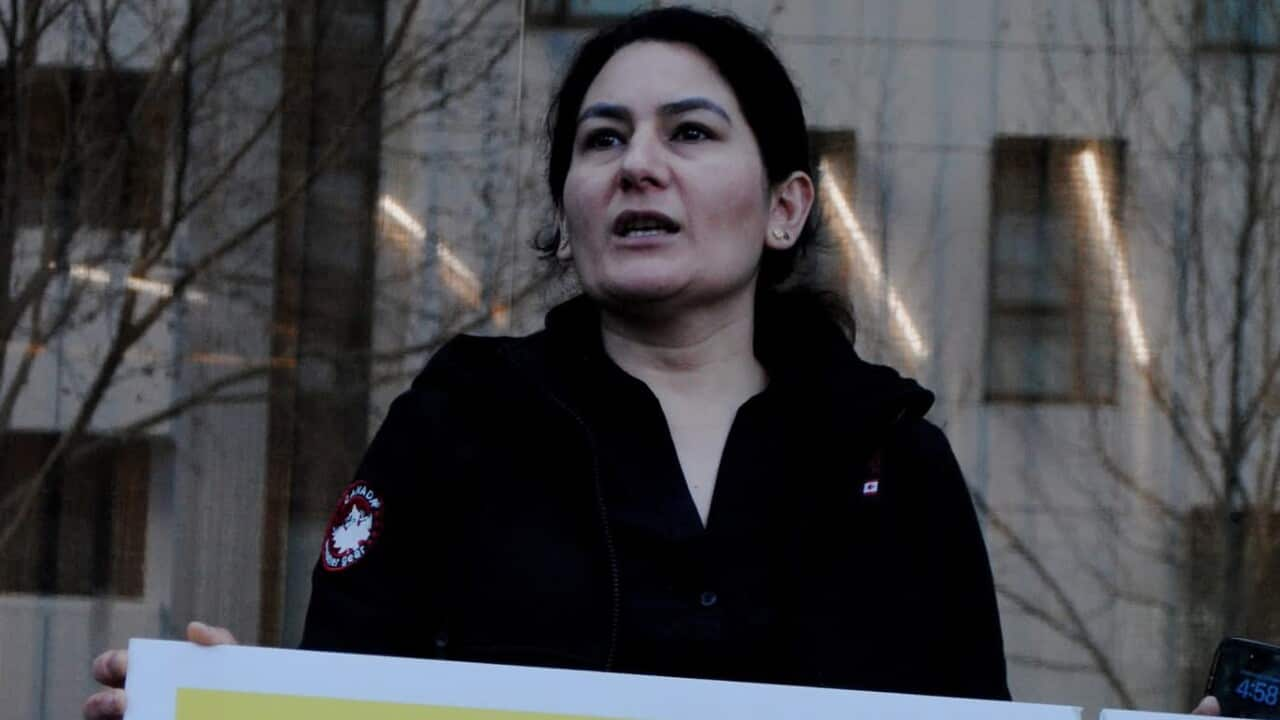Afifeh Saeidavi says she is paralysed by nightmares that she and her family will be persecuted by the Iranian government if forced to return.
The mother-of-two is a social worker and collects blood as a phlebotomist in Melbourne. Despite living in Australia for more than a decade, Labor’s new migration laws have amplified her fears of being deported.
Saedavi, her husband and their then-five-year-old son — who is now 17 — arrived in Australia by boat in 2012. After being detained on Christmas Island, they were transferred to the mainland the following year.
They live in a constant state of uncertainty, forced to renew their bridging visas every six months.
Now, Labor’s new suite of migration laws has exacerbated their fear of being separated from Saidavi’s youngest son, who was born in Australia.
“He always says, ‘It does not make sense to me. I am counted as an Australian, but you are not accepted here’,” she told SBS News.
“We are living in stress again,” she said, explaining how scared her 11-year-old son is by the prospect of losing his family.
She said her family, who were part of Iran’s Arab minority, was persecuted by the government.
“We ran away from pain, from lack of safety and insecure life to go through this. It’s such an inhumane and unfair procedure.”
The 42-year-old fears Labor’s new migration laws have the power to “destroy” lives and is urging the government to reverse the bills passed on Thursday.
With the support of the Coalition, Labor passed three amendments to the Migration Act this week, which included strengthening the government’s ability to remove non-citizens and pay third countries to take refugees.
The amendments cast the future of tens of thousands of people living in Australia into doubt.
When taking into account those on bridging visas, in immigration or community detention as well as those released due to the as many as 80,000 people are at risk of removal.
Without any guarantees around safety, Saedavi worries the country she and her family could be deported to would force them back into detention-like conditions.
Afifeh Saeidavi with her husband and children. Credit: Supplied
“I’ve always been told your country is not safe to go back, so if not, what is the reason to keep me in limbo … to separate families … I call it anti-human and anti-refugee,” she added.
Under the new legislation, the government will also be able to designate a “removal concern country”, effectively banning all visa applicants from the country if it refuses to take back deportees.
If a person on a bridging visa doesn’t comply with the new removal direction, they could face a minimum of 12 months and up to five years in prison.
The bills are , which found that people could not be detained indefinitely if there was no chance of being returned to their country of origin in the reasonably foreseeable future.
Anthony Albanese defends migration legislation
The new migration laws have been described as “draconian” and “brutal” by independent MPs and human rights groups.
Advocates warn the changes will have devastating consequences for refugees and those seeking protection in Australia.
Asylum Seekers Centre CEO Frances Rush said the legislation was “cruelty codified” after it passed the Senate on Thursday.
“This is a heartbreaking outcome for the people targeted by these bills, who will feel it profoundly,” she said.
“This is monumentally out of step with Labor’s election platform for a humane and compassionate approach to refugees.”
Prime Minister Anthony Albanese defended the three bills on Friday, stating his government had “inherited an immigration system not fit for purpose”.
“We are a government that wants an inclusive Australia that stands up for that, but we understand as well that our migration system needs to be robust and needs to be not manipulated,” he told reporters.
When pressed as to what countries will be listed on the removal direction and whether Australia will ensure it only deports non-citizens to signatories of the refugee convention, his answer was brief: “We’ll implement our legislation”.
Prime Minister Anthony Albanese has defended his government’s migration amendments from criticism they were rushed through parliament. Source: AAP / Lukas Coch
Last year, Labor fulfilled a key election promise.
Saeidavi and her family are among thousands still stuck on temporary visas.
She hopes the government will consider reversing the migration bills so her sons, who both love playing football, can remain in Australia stress-free with their friends and community.
“Labor, you have always been a hope for us. Do not destroy this hope … you are giving a lot of power to others to mess up and destroy our life.”
With additional reporting by Niv Sadrolodabaee in collaboration with SBS Persian.



